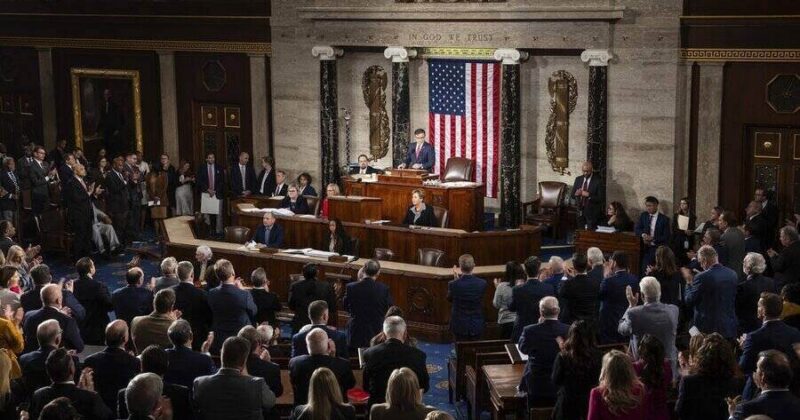Senator Jon Tester (D-MT) and Congressman Matt Rosendale (R-MT) are advocating for a healthcare legislation that may weaken a key reform within the Veterans Affairs (VA) system, one of the hallmark initiatives of former President Donald Trump.
The VA stands as the nation’s largest healthcare system, yet its record-keeping has long suffered from an outdated system. During President Donald Trump’s administration, efforts were made to modernize veterans’ health records, allowing for smoother transitions from the Defense Department to the VA.
This initiative has been touted by the Trump administration as a significant reform benefiting America’s veterans.
In 2018, former Acting Secretary Robert Wilkie signed a deal with Cerner, now under the ownership of Oracle, to modernize the healthcare IT system. The aim was to ensure smooth healthcare transitions for veterans as they move from active military duty to veteran status.
“President Trump has made very clear to me that he wants this contract to do right by both Veterans and taxpayers, and I can say now without a doubt that it does,” Wilkie said in the statement signing the contract.
“In sum, signing this contract today is an enormous win for our nation’s Veterans. It puts in place a modern IT system that will support the best possible health care for decades to come. That’s exactly what our nation’s heroes deserve,” he added.
Although strides have been taken to modernize the VA’s electronic health record system, anti-Trump lawmakers are pushing legislation that could undermine Trump’s legacy that aided America’s veterans.
This week, leaders from the House and Senate Veterans Committees, led by Senate Veterans’ Affairs Committee Chairman Jon Tester and others, unveiled H.R. 8371, the Senator Elizabeth Dole 21st Century Veterans Healthcare and Benefits Improvements Act. The bill which is aimed improving the delivery of health care for veterans and their families.
Rep. Matt Rosendale (R-MT), the chairman of the House Committee on Veterans’ Affairs Subcommittee on Technology Modernization, is actively supporting the legislation.
This bill has the potential to undermine Trump’s efforts to improve the VA health record system. Additionally, Rosendale has criticized Oracle’s handling of the transition process for the record system.
Tester frequently opposed Trump’s administration and policies, including saying that Trump’s alleged racism was dividing the country.
While intended to benefit veterans, the proposed legislation contains troubling aspects that could undermine the progress made by Trump in modernizing electronic records within the VA.
Particularly, Title V of the provision, known as the EHRM RESET Act, includes several alarming provisions. These could potentially stall the reboot of the EHRM (electronic health record modernization) project, or worse, result in its termination within two years.
Such outcomes would not only squander billions of dollars and years of endeavor dedicated to enhancing the record management system but also jeopardize the continuity of care for veterans.
The method for updating electronic health records, currently in use by the Department of Defense (DOD), serves as a testament to its effectiveness. This demonstrates that the same process can be effectively utilized to modernize health records within the VA.
Some of the concerning programs of Title V of the legislation:
- Section 511 creates a new health information technology program.
- The VA already has three major ongoing technology modernization efforts.
- Section 522 creates two sets of certifications that need to be achieved to move forward from the reset.
- The certification structure pushes a patchwork system approach and the customization that led to the lack of interoperability with VistA, the previous record system.
- This certification system removes the authority of the VA Secretary to decide for the Department and instead delegates it to more than 150 site directors.
- The fiscal 2024 Military Construction appropriations bill already takes a more strategic approach to setting metrics to determine the progress of the EHRM reset.
- Section 523 creates a two-year cliff for the EHRM program that would force sites to go back to VistA, the previous record program.
In essence, the provisiong within the bill jeopardizes the EHRM program just as strides are being made to improve the VA’s procedures.
Back in April, VA Secretary Denis McDonough praised the Department’s implementation of the EHR system, labeling it as “successful,” and said the “feedback was very positive.”
“One measure of success there is the speed with which we’ve returned to a higher level of pre-deployment appointments for veterans,” McDonough said at a House Appropriations hearing.
“So, overall, that deployment has been on the high level of expectations.”
Despite the multitude of provisions that could potentially undermine Trump’s legacy on Veterans Affairs, it remains uncertain whether House Speaker Mike Johnson (R-LA) will allow the advancement of this legislation with these controversial provisions. Lawmakers focused on Veterans Affairs are urging the Speaker to greenlight the legislation just before Memorial Day.
“It’s hardly surprising that Matt Rosendale — who is heading for the exits following an aborted Senate run and a suspiciously abrupt decision not to seek reelection — is helping Biden and the Democrats scrap yet another Trump era win,” a source close to Trump stated.
“But it is astonishing that House Republican leadership is considering the possibility of lending him a hand. After almost two years of delivering zero wins for our voters they’re moving on to undoing previous wins.”
Share your thoughts by scrolling down to leave a comment.

